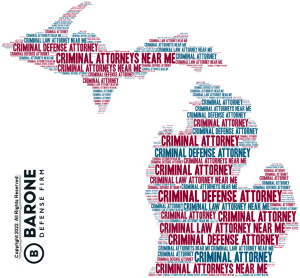Search
What is Proximate Causation in a Michigan Drunk Driving Causing Death Case
Michigan Drunk Driving Lawyer Explains Proximate Causation
 What is Proximate Cause?
What is Proximate Cause?
A drunk driving causing death case always involves allegations that (1) a person was driving a motor vehicle, (2) while intoxicated, (3) the operation of the motor vehicle caused the death of another. As previously described, proving the “vehicle caused the death of another” involves two kinds of causation. Factual causation and proximate causation.
Of the two kinds of causation, proximate causation is the more difficult one for a prosecuting attorney to prove. On the other hand, it is also the more difficult one for the DUI attorney to defend. Partly because it is so complicated. Even the best drunk driving lawyers in Michigan have difficulty grappling with this issue.
Proximate cause It is also the more difficult one to understand and this is particularly true for criminal defense lawyers and prosecutors who are far less adept at utilizing these concepts than are civil lawyers handling negligence cases.
Also adding to the difficulty inherent in proximate causation because it is variously applied depending on the kind of case being litigated. In negligence law, proximate cause is often used to limit the otherwise limitless culpability that would inure using only the but-for test. Proximate cause is also wrapped around the concept of foreseeability.
Proximate Cause is all About Foreseeability
The question of proximate cause turns upon a determination of whether it was foreseeable that the operation of the vehicle could create a risk of death to the victim. Because it is generally accepted that driving a motor vehicle is inherently dangerous and that motor vehicle accidents can result in death, like factual causation, proximate causation is again, rarely an issue in an OWI causing death case. Nevertheless, proximate causation must be carefully considered for the defendant to be held responsible for the death.
According to Michigan case law, proximate cause is more nuanced than factual causation. In an OWI causing death case, for the driver’s conduct to be regarded as a proximate cause, the death must be a ‘direct and natural result’ of the defendant’s actions. However, even if the State can prove both factual and proximate causation, there may still be a causation defense.
What is a Supervening Intervening Cause?
In making a proximate cause determination, it is necessary to examine whether there was an intervening cause that superseded the defendant’s conduct such that the causal link between the defendant’s conduct and the death was broken. If an intervening cause did indeed supersede the defendant’s act as a legally significant causal factor, then the defendant’s conduct will not be deemed a proximate cause of the victim’s injury.
As it relates to proximate cause, the prosecutor must also prove foreseeability, but only as it relates to the existence or non-existence of a supervening intervening cause that can break the chain of causation. There can be more than one proximate cause, and for the proximate cause of another to break the chain of causation, it must be the sole cause of harm. Additionally, many courts require that the supervening intervening cause be completely unforeseeable, such as an act of God. Ordinary negligence is not enough, even if that negligence contributed to the injuries or death. For the intervening cause to break the chain of causation, it must be completely unforeseeable.
Who Decides Proximate Cause – Judge or Jury?
An important issue in vehicular homicide cases involving alcohol is who makes the determination of foreseeability, the judge or a jury? In cases where there is evidence that the injured party was negligent or where there is third party negligence this issue should be resolved prior to trial. However, this question is still being grappled with by Michigan’s appeals courts.
The dissent of one recent court of appeals case suggests that “the question of whether a cause superseded a defendant’s culpability depends on an assessment of reasonableness, and “reasonableness is, quintessentially, a jury question.” The dissenting judge goes on to explain that unless the defendant is allowed to present evidence about such things and weather conditions and negligence of the other driver, then “ the prosecution is relieved of its burden of proof as the causation and thereby allowed to try the case as if a strict liability offense.”
Another Michigan case addressing these issues and looking at the defendant’s culpability, the prosecutor does not need to prove that the negligence of the accused be the only cause of harm. If the defendant’s conduct was a contributory cause that was a substantial factor in producing the injury or death, then the prosecution has met its burden of proof.
Also, and importantly, in a Michigan drunk driving causing death case, there can be more than one proximate cause. Consequently, for the intervening cause to cut off the defendant’s criminal liability, it must be both the both unreasonable and the sole cause of harm.
What Happens if Prosecutor Can’t Prove Proximate Causation?
In a criminal case, the prosecutor has the sole burden of proof and most prove all elements of the drunk driving causing death beyond a reasonable doubt. Because of this, if the prosecutor cannot prove proximate causation, then the “causing death” enhancement will be dismissed, leaving only the underlying OWI charge. It is not likely, but is possible, for the case lacking proximate cause,to be dismissed as early as the preliminary exam. Otherwise, after the case is bound over the circuit court, the case could still be dismissed by motion or after trial.
What About Bond?
Like most things in criminal law, it’s difficult to give hard and fast rules. There are two parts to your DUI bond, and the magistrates and judges have wide latitude regarding both. The amount of your bond will therefore depend on your court, as well as your prior record. The facts and circumstances of the case will also be a factor.
How to Find the Best DUI Attorney in Michigan
 The topic of how to find the best Michigan DUI attorney near me has been discussed previously on this website. As with most such things, finding the best OWI lawyer begins with a good Google search. (DUI and OWI are the same thing). People often search “best DUI lawyer near me.”
The topic of how to find the best Michigan DUI attorney near me has been discussed previously on this website. As with most such things, finding the best OWI lawyer begins with a good Google search. (DUI and OWI are the same thing). People often search “best DUI lawyer near me.”
Once you find the person you believe to be the best DUI lawyer in Michigan, do some cross-checking. Look at their AVVO score and reviews. Also, look at their AVVO biographical information. See if they have an Amazon author’s page. The best drunk driving lawyers in Michigan will be authors of books, book chapters and articles in various periodicals.
Another thing to consider is specialized training, such as trial lawyers college and psychodrama training. Other training to look for is Standardized Field Sobriety Test certifications (student and instructor), as well as science training in breath and blood testing.
The top drunk driving lawyers in Michigan will also be asked to speak at professional conferences. These are the most reliable indicator that you’re considering one of the best drunk driving attorneys in Michigan. Be cautious of bogus credentials. There are many “pay to play” credentials that nearly any lawyer can obtain, and they often sound quite impressive, like top 100 trial lawyers and many other similar “awards.”
How Much Does a Lawyer Cost For Causing Death Case?
DUI/OWI causing death and/or serious injury are among the most difficult criminal law cases a lawyer can handle. They require a large investment of time, and even though many lawyers charge flat fees, those fees are based on the number of hours spent defending and representing a client. Expect to pay upwards of $20,000 for such expertise. Depending on the nature of the causing death cases, representation can run close to six figures for these cases.
When you call the Barone Defense Firm for your free no obligation consultation you will be given a firm quote for the retainer. We have several different fee and payment options and these will also be discussed.
Drunk driving causing death cases are extremely difficult to defend, and if you’re charged with this crime, be sure to hire the best. At the Barone Defense Firm we have successfully litigated OWI cases involving substantial injury or deal for more than 3 decades.
If you’d like a free review of your case, then contact one of the top rated Michigan DUI lawyers at the Barone Defense Firm for a case review.
 Michigan Criminal Defense Lawyer Blog
Michigan Criminal Defense Lawyer Blog

